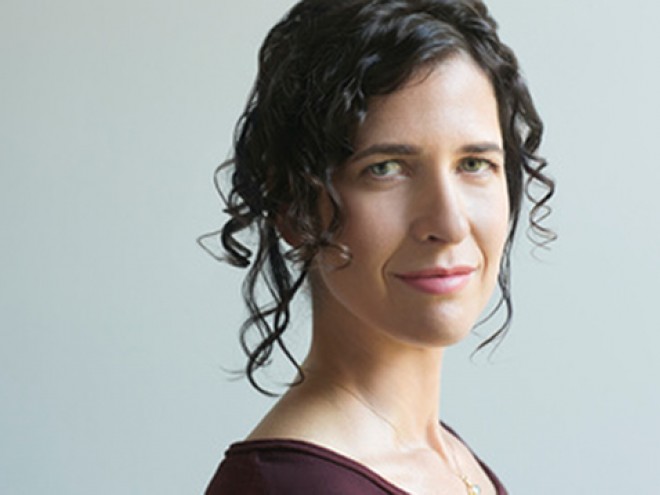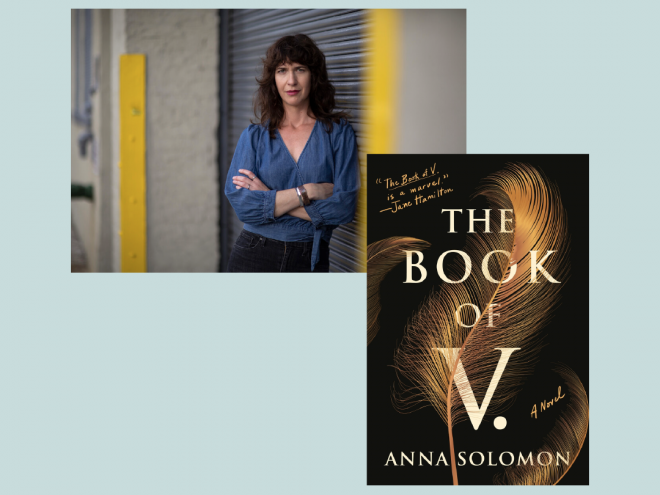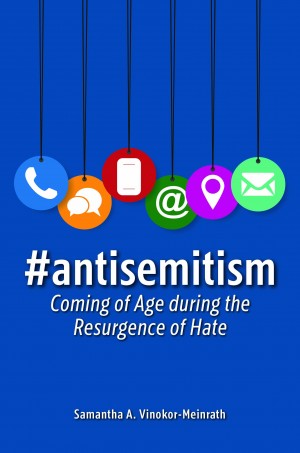The story of Esther is often told as the triumph of a Jewish minority over one man’s blinding hatred, through the courage and selflessness of one woman. Anna Solomon’s The Book of V. challenges this simple narrative — asking, what is Vashti’s story? And how do we choose to represent women’s lives, both in the past and today?
The narrative alternates between the historical Esther’s perspective, Vivian, known as Vee, a 1970s wife of a senator, and Lily, a modern-day Brooklynite, second wife, and mother of two. Each of these women’s lives is constrained by the expectations of a patriarchal society. Vee enjoys her socialite life but is plagued by her husband’s past and her own insecurities when she compares herself to her peers; Lily is haunted by the memory of her husband’s first wife, and cannot relinquish feelings of ineptitude towards her domestic duties and her marriage.
Storytelling becomes a powerful tool — in choosing hero and villain, and in determining how the story arrives at its famous ending. The novel begins with Lily reading the story of Queen Esther to her two young daughters while internally struggling with its incongruities. We are introduced to Vee as she prepares a banquet for D.C.’s elite, while dealing with her husband’s insistence and apathy towards her wishes. We then see the world of the real-life Esther, which contrasts sharply with the idealized version often presented: there are constant raids on the Jewish community, struggles to make ends meet, all while Esther desires to be humble and yet live up to her proud heritage. Ultimately, Esther’s uncle decides to enter her into the pageant — both a far-fetched scheme for her to tell the king of her uncle’s figs, and a more grounded plan to remove his beautiful, young niece from his temptation.
The Book of V. explores the idea of people living on the margins — geographically, socially, and economically. In Esther’s era, Jews are forced to live outside the city walls in the punishing desert heat, and struggle with community tensions brought on by economic insecurity. In the 1970s, Vee looks for belonging and purpose, first by supporting her husband’s political career and then when she stays with her close friend Rosemary and her family. At the whim of structures created by men that leave her without meaningful agency, she is given worth solely based on her beauty — the only currency she has left. Lily, too, looks for liberation in domesticity, striving to understand how she can have chosen to be a stay-at-home mom, even as her own mother sees her as a failed academic. She tries to find solace in sewing her young daughter’s Purim costumes, but instead feels out of place among the seemingly perfect, PTA mothers she meets at a sewing group.
Magic, pride, and the mother-daughter relationship are all allusive, tempestuous creatures — not to be taken lightly; each costs something. Solomon’s book is deeply introspective, long passages deftly chronicle each protagonist’s inner thoughts. Each line of dialogue also feels weighty, and yet leaves a lingering sense that communication is always just adjacent from the truth. The Book of V. offers new interpretations of the story of Esther, and criticizes the way in which it has been told for thousands of years.
Simona is the Jewish Book Council’s manager of digital content strategy. She graduated from Sarah Lawrence College with a concentration in English and History and studied abroad in India and England. Prior to the JBC she worked at Oxford University Press. Her writing has been featured in Lilith, The Normal School, Digging through the Fat, and other publications. She holds an MFA in fiction from The New School.






